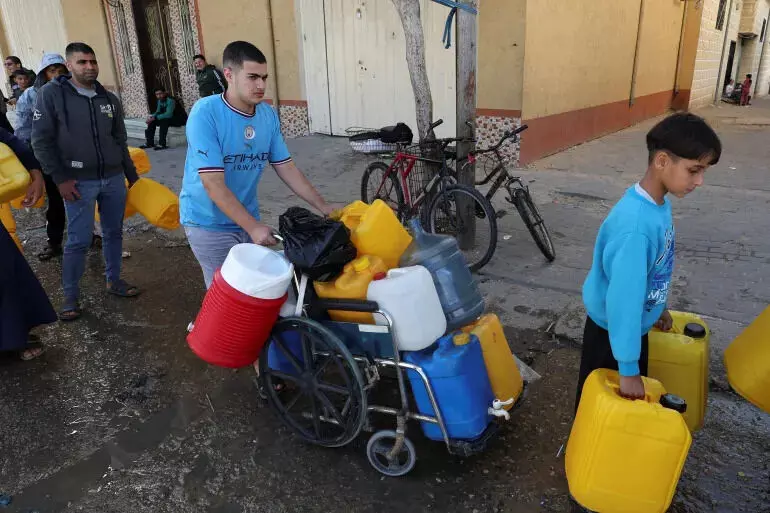
Amid Israeli siege, WHO warns disease may kill more people in Gaza than bombs
text_fieldsDrinking water shortages raise risk of gastrointestinal diseases spreading in the Gaza Strip [Pic: Ibraheem Abu Mustafa/Reuters]
Gaza Strip: The World Health Organisation (WHO) has warned that if the sanitation and health systems in the Gaza Strip are not fixed, more people may perish from disease than from bombardment.
Since Israel began its attacks on Gaza on October 7, shortages of fuel and supplies, as well as deliberate attacks on hospitals and United Nations facilities, have severely damaged critical infrastructure throughout the besieged enclave.
“Eventually we will see more people dying from disease than from bombardment if we are not able to put back together this health system,” said Margaret Harris, a spokesperson for the WHO, speaking at a briefing in Geneva on Tuesday, Al Jazeera reported.
She expressed concern about the incarceration of part of the hospital's medical staff by Israeli soldiers who had taken control of the facility earlier this month and called the collapse of al-Shifa Hospital in northern Gaza a "tragedy."
She also expressed alarm once more about the increase in infectious disease epidemics in Gaza, especially those related to diarrhoea.
She stated, citing a UN assessment on the living circumstances of displaced people in northern Gaza, “[There are] no medicines, no vaccination activities, no access to safe water and hygiene and no food.”
‘Risk of major outbreaks’
A halt of operations of all major sanitation services in Gaza raises the possibility of a massive outbreak of infectious and gastrointestinal disorders, including cholera, among the local population.
It is now nearly difficult for Gaza's 2.3 million inhabitants—half of whom are children—to find clean drinking water.
Over 44,000 cases of diarrhoea and 70,000 cases of acute respiratory infections have been reported to the WHO; however, the actual numbers could be much higher.
The UN health agency expressed grave concern that the current severe situation could worsen due to rain and flooding over the upcoming winter season.
James Elder, a spokesman for the UN organisation for children in Gaza, informed reporters via video link that hospitals were overflowing with children suffering from war wounds and diarrhoea as a result of drinking contaminated water.
If nothing changes, “there will be more and more people falling sick and the risk of major outbreaks will increase dramatically”, Richard Brennan, the regional emergency director for the Eastern Mediterranean region at WHO, told Al Jazeera earlier this month
Truce is not enough
The Ministry of Health, which is managed by Hamas, stated that fuel for generators at hospitals located in the northern part of the territory has not yet arrived, despite the temporary truce deal between Israel and Hamas being extended by two days just before it was about to expire on Tuesday morning.
The humanitarian situation, according to UN official Tor Wennesland, "remains catastrophic."
It “requires the urgent entry of additional aid and supplies in a smooth, predictable, and continuous manner to alleviate the unbearable suffering of Palestinians in Gaza,” the UN special coordinator for the Middle East peace process said.
Yahya al-Siraj, the mayor of Gaza City, issued a warning about a potential "catastrophe" for public health when he stated that the region could not pump clean water or remove rubbish that was piling up in the streets without fuel.
At al-Shifa, the biggest hospital in Gaza, cleanup was under progress. “We hope it can soon resume its activities,” said Gaza health ministry spokesman Mahmud Hammad.






















